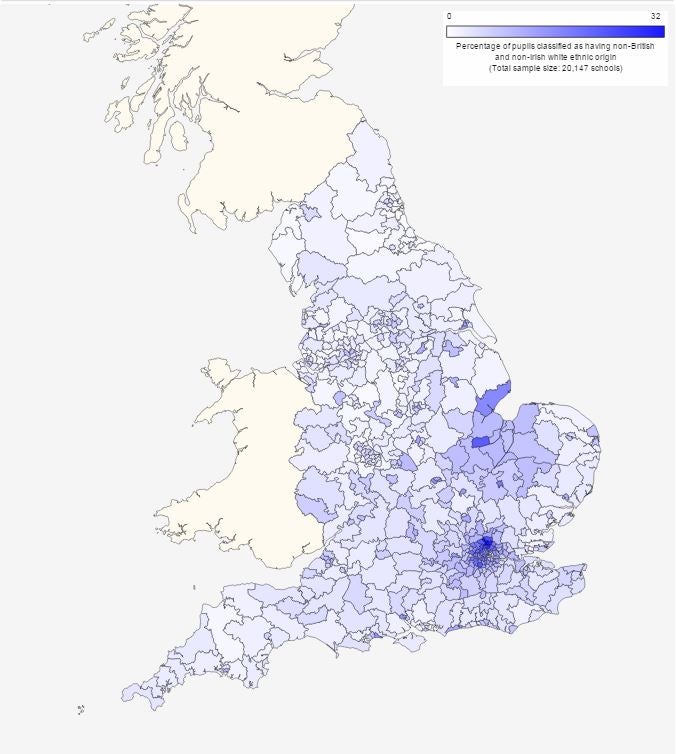UK schools with large numbers of EU migrant pupils 'perform better'
School Dash analysts suggest that white European children may improve their school's academic attainment levels as a result of greater work ethics

Your support helps us to tell the story
From reproductive rights to climate change to Big Tech, The Independent is on the ground when the story is developing. Whether it's investigating the financials of Elon Musk's pro-Trump PAC or producing our latest documentary, 'The A Word', which shines a light on the American women fighting for reproductive rights, we know how important it is to parse out the facts from the messaging.
At such a critical moment in US history, we need reporters on the ground. Your donation allows us to keep sending journalists to speak to both sides of the story.
The Independent is trusted by Americans across the entire political spectrum. And unlike many other quality news outlets, we choose not to lock Americans out of our reporting and analysis with paywalls. We believe quality journalism should be available to everyone, paid for by those who can afford it.
Your support makes all the difference.Schools with a large number of immigrant children from the European Union outperform those without, new research suggests.
While the number of white non-British or Irish schoolchildren increased by just 1.2 per cent between 2011 and 2015 overall, some areas have experienced an individual increase of up to 30 per cent, according to data analyst group School Dash.
But rather than place extra strain on teachers, figures show that schools where pupils speak English as an additional language do in fact perform better.
The findings follow reports that white British pupils fall behind their ethnic minority classmates, fuelling concerns that parents do not provide enough support or place importance on academic success for their children.
Dr Timo Hannay, founder of School Dash, said: “On the whole those schools that have large numbers of non-British white pupils tend to do better than schools that have a smaller number of them.”
Using data from more than 20,000 schools across the country, the report aims to shed light on the impact EU expansion and immigration has had on Britain's schools ahead of the referendum later this month.

Dr Hannay, the report's author, said there are no national statistics for the number of British school pupils from the EU, so he used figures for white non-British and non-Irish children to give an approximate picture.
The figures show that London, Peterborough and parts of Lincolnshire and Norfolk have had the biggest influx of EU immigrant children enrolling in its schools.
Schools with high white immigration levels were found to do better than their low white immigration rivals, particularly in London, where racial diversity is most frequent.
“This may seem surprising,” the School Dash report noted, “Why would schools with large numbers of foreign kids, many of whom learned other languages before picking up English, do better academically than similar schools catering mainly for native British pupils?”
Dr Hannay suggested the difference may be because immigrant families value education more than British natives.
He said: “Educationists tend to see having English as an additional language as a positive indicator of educational outcomes because a lot of those immigrant communities take education incredibly seriously.”
”So even though the child may not have learnt English as a first language, they still may be adept at it and on the whole they seem to do better at school.“
He added: ”The increase in performance seems to be a London-specific effect. Why is that? There are two hypotheses and I suspect they are both a little bit true.
“One is that London is better at assimilating and educating those kind of children, it has got a very diverse population and its schools in recent years have got quite good, and maybe London for one reason or another is a better environment for those kids to thrive.
”The other is that it may well be that the better educated and more aspirational immigrant families tend to end up disproportionately in London than in other areas.“
“I'm the son of a Polish immigrant, the husband of a Japanese immigrant, and have been an immigrant myself,” stated Dr Hannay in his report. “It will therefore not surprise you to learn that in general I'm in favour of people being able to move about the world freely.”
“However, as usual, our purpose here is not to make the case either way but rather to analyse the numbers as objectively as we can.”
Join our commenting forum
Join thought-provoking conversations, follow other Independent readers and see their replies
Comments